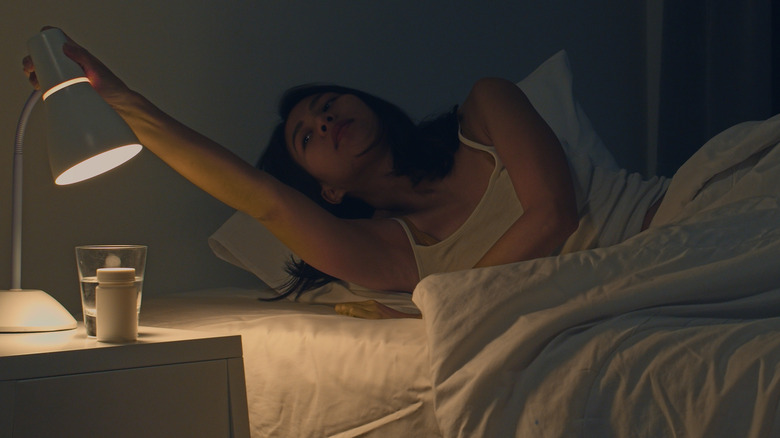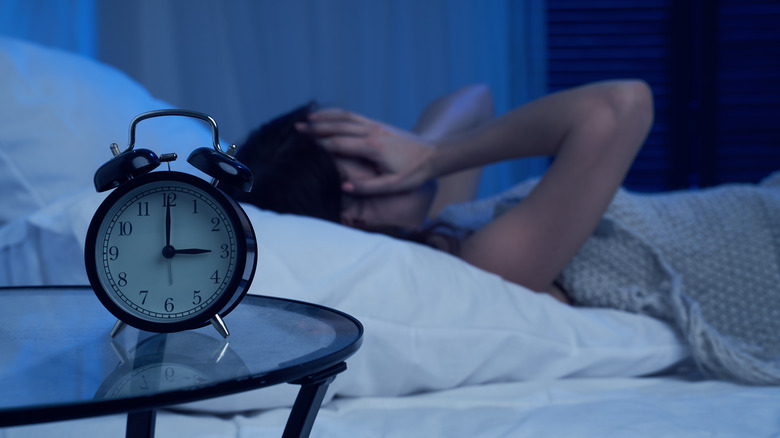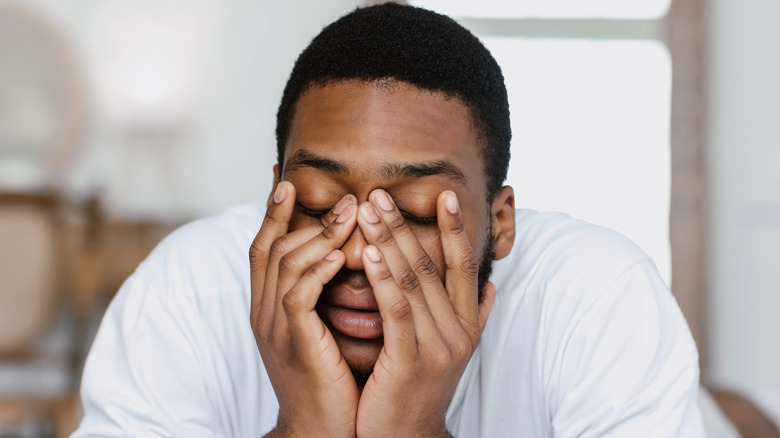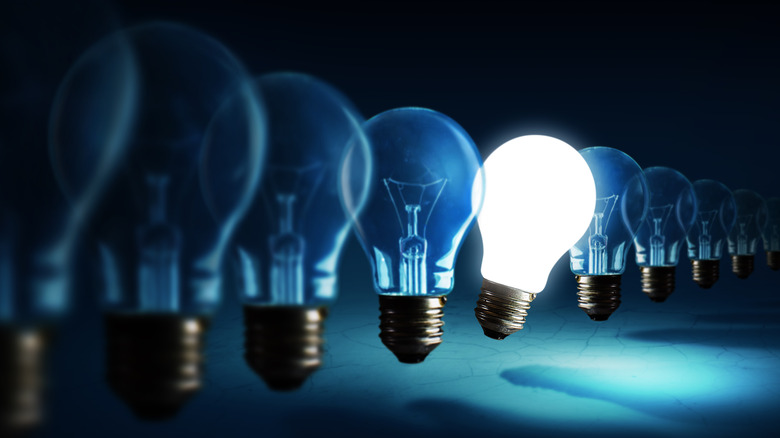When You Sleep With The Light On, Here's What Happens To Your Body
You may think you've long since outgrown that cute little cartoon nightlight you had in your childhood, but millions of adults have a 21st-century version of that same thing — cphones, TVs, or that bedside lamp you forgot to switch off because you fell asleep sitting straight up, reading a book. It may seem innocuous, particularly if it's a years-long habit and you haven't developed insomnia (yet), but this constant exposure to light can wreak havoc on your body.
Whether you live in an urban, suburban, or rural environment, there are outside factors impacting how deep your sleep is or how often you wake during the night. Sleeping alone typically makes for a more restful night than sleeping with a partner, for example, because you're not awakened by their tossing and turning, snoring, or swiping through social media (via AmeriSleep). Living near streetlights, busy roads with frequent emergency vehicles driving through, or nocturnal animals can mean a constant flow of interruptions (via Cleveland Clinic). That's why you should make every effort to adjust the things you do have control over.
Lights disrupt your circadian rhythm
Humans have a natural cycle of sleepiness and wakefulness, brought to us for free by the sun! We get up when there's light and we sleep when it's dark. This is known as the circadian rhythm, but you may know it better as the colloquial term "biological clock." Your body has an entire system of biological clocks that manage different organs and tissues, and all of these workers are controlled by a "master clock," the suprachiasmatic nucleus, or SCN, the National Institute of General Medical Sciences explained.
Artificially illuminating the night, whether with ceiling lights or table lamps, confuse it. Your body is unsure of what to do when the outdoors is telling it to do one thing, but the indoors is telling it another. According to Dr. Mark Dingman, biobehavioral health professor and author of "Your Brain, Explained," the SCN is what establishes systems and processes in your body like hunger and physical activity (via Neuroscientifically Challenged). So when you confuse it with artificial light, it can't modulate those essential daily tasks the way it needs to.
Sleeping with the light on is bad for your eyes, even if they're closed
Do a lot of reading for work or fun? Failing to turn the light off before bed can cause ocular fatigue that, in turn, reduces reading performance. Even the dimmest light can produce an effect. A study published in the Journal of Korean Medical Science found exposure to light of just 10 lux (your typical office has the light of about 500 lux) affected sleepers' eyes.
The researchers' survey found that "eye tiredness, soreness, focusing difficulty and vision discomfort increased," and their own scientific observations further concluded that measurements of eye pressure and conjunctival hyperemia (a symptom of pink eye, glaucoma, and other eye-related diseases) had a negative correlation with ambient light exposure while sleeping.
Because everyday shoppers are accustomed to buying lightbulbs based on wattage, the U.S. Department of Energy began to require lumens labeling in 2011 (via FTC). Lumens are the measurement for how bright a light is; 1 lux equals 1 lumen per square meter.
Poor sleep has physical effects
As light disrupts your sleep, it disrupts your health. At Harvard, researchers associated changes in circadian rhythm with obesity and increased risk of diabetes. In one study, participants' "blood sugar levels increased, throwing them into a prediabetic state, and levels of leptin, a hormone that leaves people feeling full after a meal, went down," wrote the authors at Harvard Health.
Melatonin, a naturally produced hormone that aids in sleepiness, is impeded by light. Lowered levels of melatonin have been linked to certain types of cancer, possibly because melatonin slows the development of tumors. But save your money at those natural food stores — according to Matthew Walker, author of "Why We Sleep," popping a melatonin pill and then climbing into bed doesn't do much. While it has limited usefulness if you take it to help adjust to a new time zone (which you do by taking it earlier in the day, not right when you're trying to sleep), it is essentially a placebo otherwise.
Not all light is created equal
Multicolored lights aren't just for your front porch or dance clubs. Blue light, which is emitted from electronic devices including phones and televisions, is great for keeping you awake. White light, which is emitted by the sun and fluorescent lightbulbs, is also adept at keeping you alert. But as the sun begins to set, your circadian rhythm needs less of it (via CDC).
If you simply must have light after the sun sets (and who doesn't?), it's best to transition to yellow, orange, and red light. They have little to no effect on your circadian rhythm, per the CDC. Many electronic devices have built-in or downloadable apps that can shift from blue to orange, and you can set them to automatically adjust based on your time zone, season, and typical bed and wake times. Replacing your bedside lamp's regular bulb with a red one is a great way to give you what you need to relax and wind down without keeping your brain and eyes wired.





